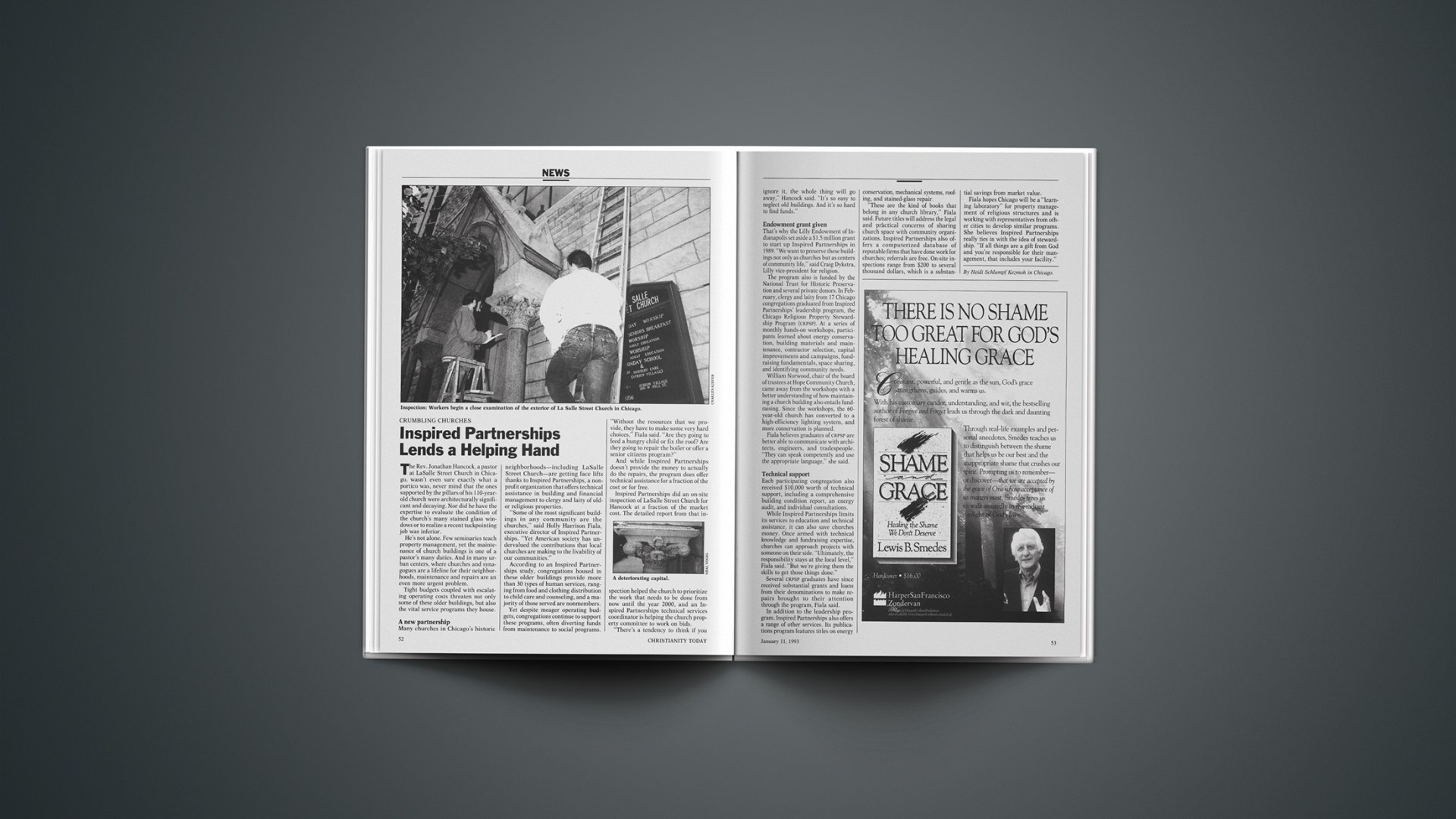The Rev. Jonathan Hancock, a pastor at LaSalle Street Church in Chicago, wasn’t even sure exactly what a portico was, never mind that the ones supported by the pillars of his 110-year-old church were architecturally significant and decaying. Nor did he have the expertise to evaluate the condition of the church’s many stained glass windows or to realize a recent tuckpointing job was inferior.
He’s not alone. Few seminaries teach property management, yet the maintenance of church buildings is one of a pastor’s many duties. And in many urban centers, where churches and synagogues are a lifeline for their neighborhoods, maintenance and repairs are an even more urgent problem.
Tight budgets coupled with escalating operating costs threaten not only some of these older buildings, but also the vital service programs they house.
A new partnership
Many churches in Chicago’s historic neighborhoods—including LaSalle Street Church—are getting face lifts thanks to Inspired Partnerships, a nonprofit organization that offers technical assistance in building and financial management to clergy and laity of older religious properties.
“Some of the most significant buildings in any community are the churches,” said Holly Harrison Fiala, executive director of Inspired Partnerships. “Yet American society has undervalued the contributions that local churches are making to the livability of our communities.”
According to an Inspired Partnerships study, congregations housed in these older buildings provide more than 30 types of human services, ranging from food and clothing distribution to child care and counseling, and a majority of those served are nonmembers.
Yet despite meager operating budgets, congregations continue to support these programs, often diverting funds from maintenance to social programs. “Without the resources that we provide, they have to make some very hard choices,” Fiala said. “Are they going to feed a hungry child or fix the roof? Are they going to repair the boiler or offer a senior citizens program?”
And while Inspired Partnerships doesn’t provide the money to actually do the repairs, the program does offer technical assistance for a fraction of the cost or for free.
Inspired Partnerships did an on-site inspection of LaSalle Street Church for Hancock at a fraction of the market cost. The detailed report from that inspection helped the church to prioritize the work that needs to be done from now until the year 2000, and an Inspired Partnerships technical services coordinator is helping the church property committee to work on bids.
“There’s a tendency to think if you ignore it, the whole thing will go away,” Hancock said. “It’s so easy to neglect old buildings. And it’s so hard to find funds.”
Endowment grant given
That’s why the Lilly Endowment of Indianapolis set aside a $1.5 million grant to start up Inspired Partnerships in 1989. “We want to preserve these buildings not only as churches but as centers of community life,” said Craig Dykstra, Lilly vice-president for religion.
The program also is funded by the National Trust for Historic Preservation and several private donors. In February, clergy and laity from 17 Chicago congregations graduated from Inspired Partnerships’ leadership program, the Chicago Religious Property Stewardship Program (CRPSP). At a series of monthly hands-on workshops, participants learned about energy conservation, building materials and maintenance, contractor selection, capital improvements and campaigns, fundraising fundamentals, space sharing, and identifying community needs.
William Norwood, chair of the board of trustees at Hope Community Church, came away from the workshops with a better understanding of how maintaining a church building also entails fundraising. Since the workshops, the 60-year-old church has converted to a high-efficiency lighting system, and more conservation is planned.
Fiala believes graduates of CRPSP are better able to communicate with architects, engineers, and tradespeople. “They can speak competently and use the appropriate language,” she said.
Technical support
Each participating congregation also received $10,000 worth of technical support, including a comprehensive building condition report, an energy audit, and individual consultations.
While Inspired Partnerships limits its services to education and technical assistance, it can also save churches money. Once armed with technical knowledge and fundraising expertise, churches can approach projects with someone on their side. “Ultimately, the responsibility stays at the local level,” Fiala said. “But we’re giving them the skills to get those things done.”
Several CRPSP graduates have since received substantial grants and loans from their denominations to make repairs brought to their attention through the program, Fiala said.
In addition to the leadership program, Inspired Partnerships also offers a range of other services. Its publications program features titles on energy conservation, mechanical systems, roofing, and stained-glass repair.
“These are the kind of books that belong in any church library,” Fiala said. Future titles will address the legal and practical concerns of sharing church space with community organizations. Inspired Partnerships also offers a computerized database of reputable firms that have done work for churches; referrals are free. On-site inspections range from $200 to several thousand dollars, which is a substantial savings from market value.
Fiala hopes Chicago will be a “learning laboratory” for property management of religious structures and is working with representatives from other cities to develop similar programs. She believes Inspired Partnerships really ties in with the idea of stewardship. “If all things are a gift from God and you’re responsible for their management, that includes your facility.”
By Heidi Schlumpf Kezmoh in Chicago.










